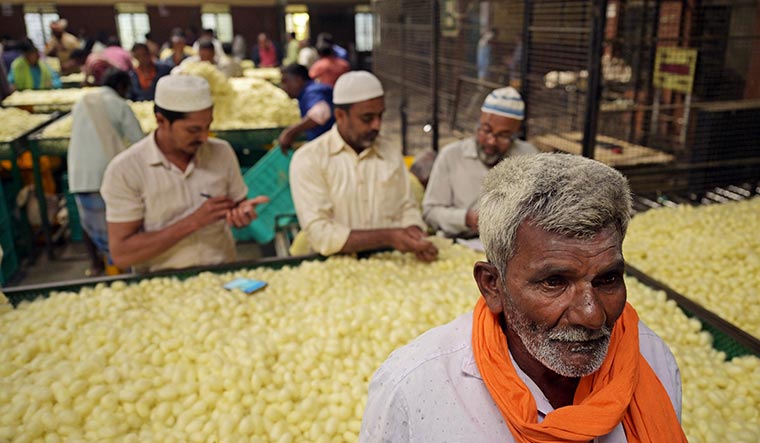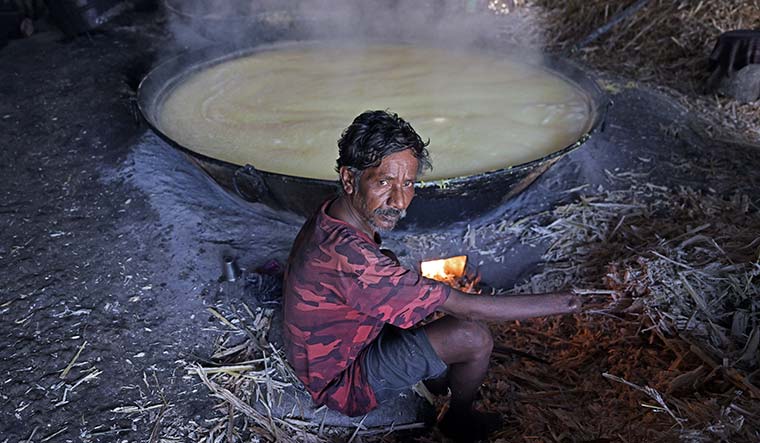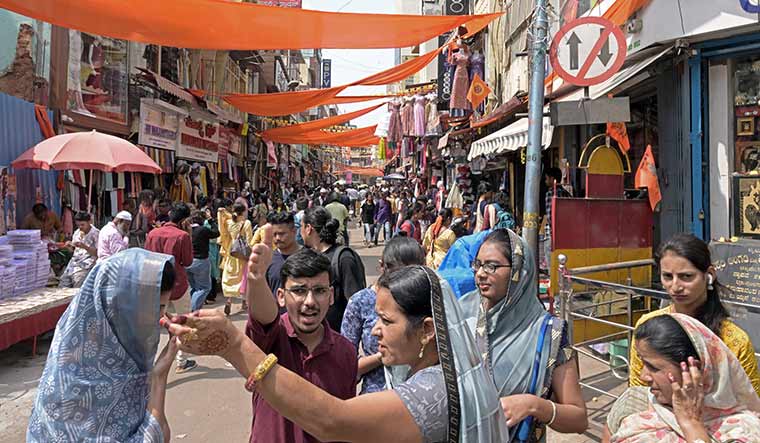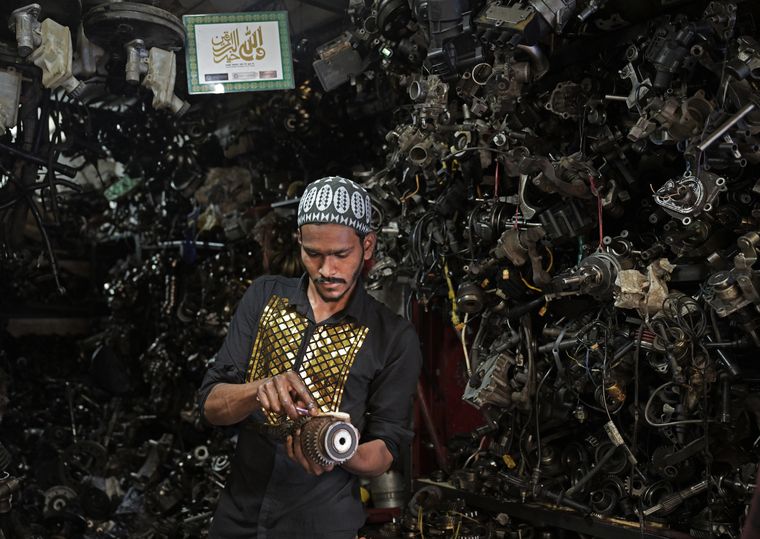KARNATAKA
Prakash Jain’s thriving little showroom in Chickpet sells knock-off sportsgear. Bhanu (photojournalist/translator/wise-veteran-to-my-bumbling-rookie) and I marvel at the material, the tailoring, the Nike swoosh, the Adidas trefoil and the Reebok vector―excellent enough to satisfy even the most snooty gym auntie. Prakash smiles his unassuming smile, feeds us hot-from-the-kadhai samosas and kachodis and confides that he plans to visit the Ram Temple in Ayodhya soon.
‘But you’re a Jain,’ we say. ‘So what?’ Prakash shrugs. ‘Ram is there in Jainism also. Sita, Lakshman everybody! I go to temple, I go to church, I go to gurudwara.’ After an infinitesimal pause he adds, ‘I go to mosque also.’
Chickpet market, dating back to the 16th century, is Bengaluru’s largest commercial hub―chock-a-block with wholesale and retail cloth, jewellery and bartan (utensil) outlets. It is a BJP stronghold, home to the second-largest Marwari population in south India, and represented by the firebrand MP, 33-year-old Tejasvi Surya, an ardent advocate of hindutva. The consecration of the Ram Temple on January 22 was marked by a celebration ‘bigger than Diwali’ in Chickpet.
‘Amit Shah is the most powerful man in India,’ Prakash says as we sip bright orange chai from tiny paper cups. ‘He stays in the background, but from there PM, CM, the big industrialists, he pulls all their strings.’ He goes on to confide that he does not discuss politics with his parents, but only with his friends. It is a matter of respect.
The wind chime dangling at the front of the shop tinkle as the door is thrown open and a young kinnar (transperson) catwalks confidently down the length of the shop to stand before us. Her red sari-choli is tied low and tight in a trending style, and her phone is tucked into her waistband, accentuating her toned midriff. Throwing a slender arm up into the air, she first makes snatching gestures, then throwing gestures, hissing fiercely all the while. Then she turns around and stalks out, as stylish as a supermodel. Prakash explains that he has given an annual contract to the kinnars to ward off drishti, or evil eye, on a daily basis. Whose drishti is he worried about exactly? ‘Oh!’ He smiles wryly. ‘Those in my inner circle mostly. They’re the ones who envy your success, not outsiders or strangers.’
Outside, we chat with Shibana, a young kinnar. She is 20 years old and Tamilian, with no voter ID and no intention of voting. The elections make no difference to her whatsoever―’whichever one comes and whichever one goes they’re all the same’.
ONE LANE AWAY, on the third floor above the Kela market is Praveen Traders, a packed-to-the-rafters party supplies shop. The Praveen in charge here is 32 years old, cherubic and flushed with excitement about the Ram Temple. We ask him if his employees―several of whom are Muslims―were upset about the celebrations on January 22. ‘None!’ He responds strongly. ‘There are no hard feelings at all, because it was originally a temple!’ When we look unconvinced he explains. ‘See, earlier the Congress used to instigate Muslims to do galata, but now the Congress is too weak to wind up anybody, so everything is peaceful and good.’
Wah! We all agree that Ram Rajya is finally here. ‘Your values are so Indian but everything you sell here is so western,’ Bhanu comments, looking around at the bride-to-be sashes, Mexican Fiesta buntings, superhero foil balloons, Viking helmets and Hawaiian garlands on display. He twinkles. ‘Sir, that is just supply and demand!’
I wonder what Modiji will find to do now that the temple has been built. Like, what promise is even left unkept? ‘He’ll end reservations,’ Praveen says at once. ‘And bring in CAA. Properly.’ Bhanu suggests that in his third term Modiji might instead focus on being universally loved, and decide to make everyone happy, including minorities and the backward communities. A slight frown mars Praveen’s cheerful face. He says, decidedly, ‘Then there is always Yogiji.’
FOUR KILOMETRES AWAY stands Shivaji Nagar, another huge commercial district and part of Bangalore Central―a cocktail of a constituency containing around 5.5 lakh Tamilians, 4.5 lakh Muslims, two lakh Christians, plus a significant number of Marwaris and Gujaratis. There is also the class factor―plush bungalows and gated communities stand cheek by jowl with slums here. All this confusion is mirrored in the constituency’s representation―five of its eight MLAs are from the Congress, while its MP is a BJP man.
 Closely woven: The silk cocoon market at Ramanagara.
Closely woven: The silk cocoon market at Ramanagara.
In the heart of all the noise and buzz, the gear box and the hub cap shops, the juice stalls, the cane weavers and the furniture stores, the low, white and orange building of the Shivaji Nagar beef market (established 1932) squats innocuously in the sun below its cloud of swooping, constantly circling kites. Two large national flags are draped over the signage at the entrance, leaving only the ‘BE’ of BEEF MARKET visible. What we do here is legit, the flags seem to say―silently, yet defiantly. Leave us alone, please, and we’ll leave you alone.
Indeed, all of Shivaji Nagar seems to exude a similar let-me-be vibe. Mention that you’re doing a story about the ‘mood in Karnataka’ in the context of the upcoming election, and a veil seems to drop over everybody’s eyes. But then, halfway down the curiously named Plain Street, we meet Amjad Ali―lean, middle-aged and deeply tanned, with a fondness for plain speak. Lounging on a folding aluminium chair outside his garage, he dismisses the big men of the moment as randwas (old bachelors)―with no family or responsibility to ground them―always surrounded by gundas and bodyguards, wandering here and there, creating hate out of thin air.
‘Rajiv Gandhi came here in the 1980s,’ he says. ‘Without any fuss. Drove his car right down Plain Street himself, no bodyguards, nothing, all the way to Nandi Hills and back, with his wife beside him!’ I try to point out that Rahul Gandhi is a ‘randwa’, too, but am ignored. ‘The RSS doesn’t like family men! Envious of them! See what they did to Shah Rukh Khan’s family; planted drugs on his son! The police here do that, too. Whenever they see rich-looking boys on the road at night, smoking outside a pub and minding their own business, they pick them up, plant a ganja packet on them, and then ask their parents to pay Rs1.5 lakh bribe.’
But if the government is so hate-mongering and corrupt, why doesn’t anybody object? ‘ED’, Ali nods knowingly. ‘They are all afraid of ED raid.’ He smiles, pleased for the moment with his little rhyme. ‘Maybe the election will change things,’ I suggest. But he shakes his head. ‘The EVMs are rigged,’ he says. ‘No matter what button you press, the vote will go to the BJP.’ ‘So what can you even do?’ I ask. He sobers, narrowing his eyes and switching to Hindi. ‘Bhadakne ka nai [don’t get riled up],’ he says with finality. ‘Woh bhadka rahen hain, par bhadakne ka nai [they are provoking people, but don’t fall for it]. Just sit quiet, things will get worse, much worse, but after that, they will get better.’
 Sweet and sour life: Karigowda works at a jaggery making mill near Mandya.
Sweet and sour life: Karigowda works at a jaggery making mill near Mandya.
WE TAKE THE Mysore Road out of the city the next morning, passing the giant, seated statue the 12th century reformist Basavanna, the founder of Lingayatism, latticed by scaffolding and glowing in the rising sun. Basavanna teaches that the body is a temple and Shiva resides within it. No other temple is required. All Lingayats―both men or women―are required to wear a tiny linga in a canister. It staunchly opposes caste and gender discrimination, and eschews ostentation. So it’s ironic that today, the community is comprised of many number of sects and sub-castes and they are honouring their founder with the massive idol. These contradictions were pointed out by academic M.M. Kalburgi and journalist Gauri Lankesh, prominent Lingayats and committed rationalists. Both of them were assassinated, in 2015 and 2017, respectively.
Lingayats constitute roughly 17 per cent of Karnataka’s population while Vokkaligas (farmers/landowners/warriors, mostly using the surname Gowda) make up about 15 per cent. There are roughly 35 per cent OBCs, 18 per cent SC/ST, 13 per cent Muslims, and 3 per cent Brahmins. Conventional wisdom would have it that Lingayats and Brahmins will vote for the BJP, Vokkaligas will vote for the farmer-friendly Janata Dal (Secular), and the backwards and minorities will vote for the Congress. But there’s nothing conventional about Karnataka.
OUR FIRST STOP along the Mysore Road is the government-run cocoon market in Silk City Ramanagara. Around 50,000 silk cocoons are bought and sold here every day. It is quiet inside the cool, high-ceilinged halls, where heaps of fluffy cocoons gleam white and glossy upon their grilled iron carts, looking as biteable as freshly baked croissants. Numbers scroll on blue digital screens upon the whitewashed walls, while the buyers (mostly Muslim spinners and weavers) browse the carts, and the sellers (mostly Hindu farmers) stand by expectantly. I am utterly charmed―the scene is practically a postcard for the unity-in-diversity India my generation grew up with. But Bhanu points out the presence of the Karnataka police, a recent development. As if on cue, constable Prakash Singh steps up and clears his throat, ‘This is a very secular market―shut for only two days in the year―August 15 and January 26.’
We stop to chat with the Khan brothers who are here to purchase cocoons―keen-gazed Javed and his fairer, kohl-eyed, muscular brother Sayyed (three-time winner of the Mr Ramanagara body-building contest). They say everybody in their family-run business will vote for D.K. Suresh, the Congress MP and the brother of Deputy Chief Minister D.K. Shivakumar. Why? Because he believes in progress, growing the local businesses, and mohabbat between people of all faiths.
WE SPOT A couple threshing ragi on the road and walk into the fields to talk to them. Mangalamma is wiry-strong, bony-faced, with grey hair and flashing jewellery. Shivaswamy is her son-in-law. They are Lingayats; he is even a priest in the local Shiva temple. What does he think about Ram trending nowadays? His white teeth flash on his tanned face as he laughs. ‘Oh, that is like asking which mango is the best. All mango varieties are good, all our gods are good!’ Mangalamma ventures to say that the ragi yields have been lower in recent years. But that’s because of the drought, Shivaswamy says at once, cutting off his mother-in-law. He adds that Modi should rule for 40 more years.
THE HAKKI-PIKKI (bird catcher) tribals are originally from Rajasthan and Gujarat, and they treat borders with disdain. Now that bird-catching is outlawed, they travel to southeast Asia and Africa and sell their ayurvedic remedies. Their hair rejuvenation oil is well-known and supposedly efficacious. Shivaprakash, an ex-body-builder now running to fat, says Modi has raised our profile internationally. He ‘got our people back from Ukraine, singlehandedly’. He even ‘got our fellow hakki-pikki tribals home from Sudan, when trouble broke out there’.
An older lady, squatting on the ground, cleaning freshly picked tamarind, grumbles that instead of getting them back home, with large numbers of oil bottles still unsold, Modi should have got them visas to travel to less troubled countries and sell their oil there. Shivaprakash disagrees. ‘He’s better than the Congress,’ he says. ‘It’s corrupt.’ Pipes up a tough-looking younger woman, ‘BJP is corrupt also.’ ‘Yes, but Modiji is not corrupt!’ Everybody concedes this point. ‘Modi is good only for big jobs, for small jobs he is useless.’
Several healthy looking dogs, two cats (who don’t seem to mind the dogs at all) and a circle of people gather around the tamarind heap to discuss the issue animatedly. Listening in, I remember reading reports rueing the fact that footloose tribals with gypsy blood and open minds were being polarised in Karnataka. ‘The older ladies had goddess names but the younger ones all had actress names,’ I say to Bhanu as we get into our car. ‘Anushka, Deepika, Rashmika.’ We can’t decide if that’s an indicator of progress, or not.
BELEGOWDA, 75, is a sugarcane farmer in Mandya. He has owned his crushing unit and sugar mill for 42 years. We sit on the cool, red oxide floor of the stoop of the pukka house he built 16 years ago, watch the jaggery boil in an iron kadhai as wide as a well, and listen to the wiry, grey-haired man hold forth on ‘world affairs’ as his wife good-naturedly dubs them from the kitchen. ‘This new Bangalore-Mysore Expressway has taken my business off the map. People take the new road and bypass me. Sales are at an all-time low. And then there’s the GST.’ ‘But you have free electricity,’ I say. ‘Only for the pump,’ he replies. ‘Three hours a day.’ ‘Will you vote for the Congress then?’ I ask. His face grows even longer. ‘Every time the Congress comes to power there is a drought. I’ll vote for the JD(S).’ ‘But they’ve tied up with the BJP.’ He waves his hand magnanimously, ‘That is okay.’
He proceeds to name his top three prime ministers―‘Number one, Lal Bahadur Shastri; number two, H.D. Deve Gowda; number three, Atal Bihari Vajpayee.’ He looks at us challengingly, willing us to ask him about the omissions on his list. ‘What is India’s number one problem today? ’I ask him. ‘Labour shortage,’ he replies. ‘All these fellows,’ he gestures at his workers, stirring the jaggery and working the furnace before us, ‘they are drunkards, and they get free rations from the state government. So they don’t want to work.’
Later, we chat with one of his workers, Karigowda, a young, sullen-looking amputee, missing one hand at the wrist. He says the owner pays him Rs600 a day, gives food and keeps him supplied with bidi-benki kaddi (bidi and matchbox). Life could be worse. Who will he vote for? Last time he had voted for Sumalatha (actor-politician, who won as an independent). ‘But the Congress has done good things in Karnataka,’ I persist. Free bus travel for women, for instance. He grunts. ‘Stupid idea! They are whole day doing fashion, climbing into buses and gadding about, visiting temples! No work, no responsibilities! We have no control over our womenfolk. God only knows who they will vote for, and why!’
WE SPOT A Samvidhaan Jagruti march celebrating 75 years of the Indian Constitution and jump out of our car to march with the demonstrators. Men and women, smartly dressed in blues and whites, carrying printed copies of the preamble, singing songs of equality and solidarity, with an Ambedkar statue on a truck behind them. Their energy is infectious.
AT CHANNAPATNA, we meet youngsters Jaffar and Sayyad Jabeer busily turning pieces of ivory wood upon the lathe to make the famous, geographical-indicator-certified lacquered toys the town is so famous for. Speaking above the noise of the machines, the boys are very clear―it’s their first time voting―and they’re going to vote for the Congress. Shivanna, in his late fifties, self-effacing, keeping the accounts in the little workshop, looks up when addressed, nods his head genially from side to side, and, under the force of his young co-workers narrowed, kohl-rimmed eyes, sings out, ‘Oh same-same, me too, me too, Congress!’
AFTER A MUTTON curry and mudde lunch at a famous military hotel in Srirangapatna, we hit Mysuru and wander on foot around the cobblestoned Krishna Rajendra circle area. Everything is squeaky clean―there is a Dodda Clock Tower and a Chikka Clock Tower, white marble statues of various elaborately robed Wadiyar kings under pillared cupolas, healthy looking horses pulling high-sprung carriages, and in the centre of it all, the low, curving, cream-and-white facade of the18th century Devaraja fruit and flower market. Named after Maharaja Dodda Devaraja Wodeyar, the market began as a weekly affair in the time of Tipu Sultan and still retains an essentially timeless quality. I utter one soft rapturous ‘oh’ while walking down its aisles silently, stunned by the vibrancy of the colours, the scents and the textures before me. The locals eye me indulgently; they have seen this look on the faces of first-time visitors before.
Slowly, I realise the market is lit like a movie set. LED lights point down at the reds, purples, oranges and whites of the heaped flowers in every shop, making them glow like rich jewels against the dim, vandyke brownness of the aisles. Dust particles dance in the sunshine slanting down from the high skylights, adding to the drama. Pulling myself together, I sample the ittrs on display at Hidayat and Mohsin Khan’s perfumery, sniffing in between from a jar of turmeric to reset my sense of smell. ‘We’re voting for the Congress,’ they tell me unhesitatingly. But what about Modi’s 10 incredible years, I ask. ‘That’s behind us,’ they reply. ‘We like to look ahead.’
A few shops away, artificial flower garland seller Chandru Shetty says he will sit down with the Shetty community and they will together decide who will they vote for, but that his vote will be only for the BJP. He has seen me sniffing turmeric between the exotic scents in the ittr store, and says the BJP is like turmeric―voters need to return to it every now and then to ground themselves from the ‘chakkars’ caused by the foreign smells! Mighty impressed by this metaphor, I end up buying a lot of garlands from him (only to realise later that they are all over-priced).
I emerge from the cool of the covered market and ask frame-maker Manjunath which one of his gilt-edged god pictures are the most popular. He says the Lakshmi-Ganesha-Saraswati trio sell the most, but on January 22, he printed out ten high-res Ramlalla images, framed them, and sold them all in one day. Our last chat in KR circle is with a group of girls from Bengaluru’s Jyoti Nivas College, here on a weekend trip. They ask Bhanu to take a picture of them on his fancy camera. As he clicks, Kriti, an MA student, confides (almost sheepishly) that she still has faith in Rahul Gandhi.
THE NEXT MORNING, I meet 32-year-old yogini Neha Mishra ji, who toddles between high-end layouts at the foot of Nandi Hills on her pista green Scooty, teaching yoga ‘to affluent housewives and foreigners’. She has merry eyes and a gurgling laugh and she immediately agrees with Belegowda’s lament about a labour shortage. ‘That is because nobody wants to labour any longer! Everybody wants to be what we call in Bangalore an ‘Owner’! They all want their own business! The startup culture is going viral in the villages. So here in North Bangalore, with the airport, and the metro coming, the farmers are selling their land, buying their son a car so that he can become an Uber driver, and setting up a beauty parlour for their daughter!’
I TAKE A walk down the Church Street, to suss out what the bright young things are thinking. And end up chatting with a phalanx of them outside Blossoms, Bengaluru’s iconic store of new and used books. Among them is geeky young engineering student, Cedric Pinto, who is, I think, an aspiring stand-up comic, and has his friends in splits with his ‘take’ on politics. ‘Everybody likes to talk about Nehru’s blunders,” he says. ‘But everybody misses the biggest one, which was that while the Muslim fundamentalists went ahead and created Pakistan, and all the Muslim fundoos from the undivided India were welcome to go live there, Nehru only made one, secular India. He didn’t give Hindu fundamentalists an option. Like he just straight-out outlawed the RSS, and told all the right-wingers to shut the f**k up and be secular. It was totally unfair. He should’ve also created a Hindu Rashtra in some random temple belt area of the country, and told all the Hindu fundoos to go live there, and grow lotuses and drink gau mutr morning noon and night. They would’ve bounced there, and left the rest of us to live in peace. Rahul Gandhi can still do it. He should put it in his party’s manifesto. But that’s the trouble with Rahul Gandhi, he lacks both imagination and audacity. Modi and Shah have it in spades.’
I ask him who he will vote for, and he grins. ‘Ma’am I’ll use a metaphor in your honour only. In the 1990s, Shah Rukh drank Pepsi and Salman drank Thums Up. It was their passion and their ideology. Cheating on their colas was unthinkable. Cut to today―Salman is drinking Pepsi and Shah Rukh is drinking Thums Up! Anybody is drinking anything; total anarchy! They’ll jump absolutely anywhere because they’re all only interested in making money.’
Also Read
- Lok Sabha polls: The hottest battle this election season is in south India
- 'Modi's guarantees remain in speeches, my guarantees are fulfilled': Siddaramaiah
- Congress hopes its 'five guarantees' will blunt BJP's aggressive push in Karnataka
- 'Congress has a history of making adjustments with communal forces': Pinarayi Vijayan
- Why winning a seat in Kerala could remain a dream for BJP
- Can the BJP win seats in Tamil Nadu?
The point is a fair one. Karnataka politicians are a jumpy bunch. The state is a frontrunner when it comes to resort politics―the last resort, quite literally, of a desperate government trying to keep its flock together. In 1983, Chief Minister Ramakrishna Hegde of the Janata Party saved his government from being dissolved by Prime Minister Indira Gandhi by sending 80 of his MLAs to a luxury resort on the outskirts of the city, ahead of a trust vote, to protect them from the ‘Congress vultures.’ In 2019, the Congress-JD(S) combine collapsed when MLAs jumped ship to the BJP, in spite of being kept hostage by their original parties in premium five-star resorts in Mumbai and Kodagu.
There also seems to be a general agreement among voters that corruption is rampant across parties and, therefore, inevitable. It also seems that schemes set up to help people are backfiring, either because they have been imperfectly executed, or because the misinformation on the ground is so good. The World Economic Forum’s 2024 Global Report has found that the risk of disinformation and misinformation is ranked highest in India. Karnataka has a literacy rate of only 76 per cent, but clearly everybody has a doctorate from WhatsApp university. In this murky, shifting, swirly landscape, where everything looks vague and amorphous, and ‘anybody is drinking anything’, the only thing that seems to stand tall and look dependably solid is Modiji.



